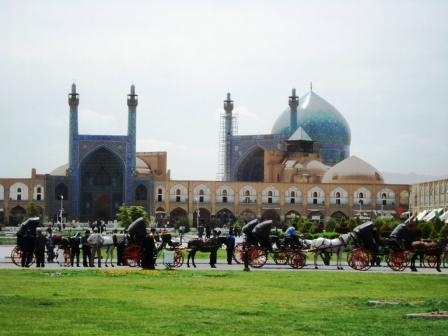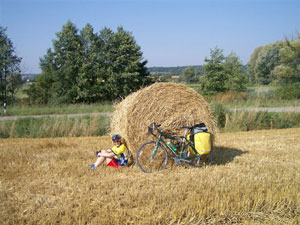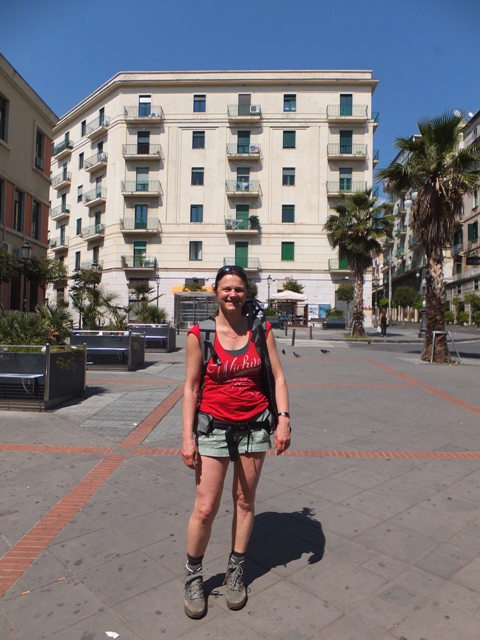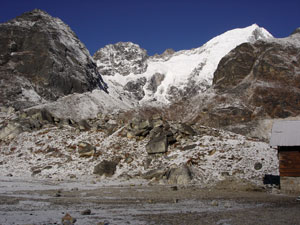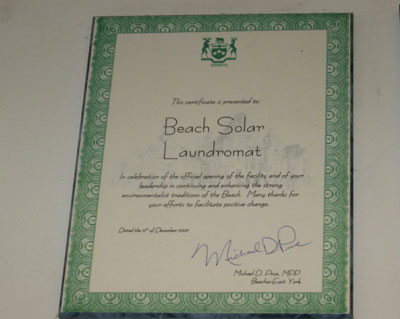7. Please comment on the role of religion in Iranian society and the situation of women.
The formal religion of Iran is Islam and most people who live in Iran are Muslim, but there are people with other religions and beliefs like Christians, Jews, Zoroastrians and others. All of them respect other religions. I know that you are interested in culture, so you know well that religions can form and affect people’s culture, and have an important impact on people’s behaviors, their contacts and encounters, or even their decisions. Like any religion, Islam too has its own rules and codes of ethics that every believer should try to respect and follow. Unfortunately some people have a negative view of Islam and think that it is a harsh religion, because of bad and painful news that we watch on TV that may deal with terrorism and murders that may occur in some Islamic communities like Afghanistan, Iraq and others.
I want to say that in Iran we do not have these extremist actions and the real Islam invites people to be kind with each other, to like other people and respect them and to help each other. Islam never says that you should kill people or hurt them. Unfortunately the bad actions of some affect the image of all Muslims. As I mentioned before, every religion has its own rules and codes of ethics, in Islam and in an Islamic community women can work outside the home and participate in social activities but they should wear a Hijab when they go out or to a place where there are strangers present. Except for the Hijab, there are no limitations for women and if they want and the norms of society let them, they can do any thing that a man can do.
8. Please tell us more about the tourism infrastructure in Iran, what about hotels, restaurants, resorts, attractions, adventure travel companies and other tourism service providers?
We have a lot of resources, but we often do not know how to use them. This refers back to our weakness in tourism management, planning and lack of knowledge which I mentioned in the first question. In Iran we have a well-developed basic tourism infrastructure, like modern hotels, active travel agencies, good restaurants with international foods and etc, but we need more companies that attract tourists with special interests. We have good natural resources for adventure travel (mountains, forests, deserts, rivers), but need more companies that are able to service tourists in these fields. Recently people are paying more attention to these forms of tourism.
9. Please tell us about safety precautions that one should follow when travelling in Iran.
Safety is very vital and a basic requirement for growing tourism in a region. Iran’s perception is often influenced by painful news from other Islamic countries in the region.
I suggest that tourists who want to visit Iran for the first time should consult with reputable and experienced travel agencies, and check the attractions that they want to take you to make sure that you visit everything you wanted to. Travelling is best done with a qualified and trustworthy local guide. You can search on the Internet and find attractive places and attractions that you are looking for, and during your visit, especially in traditional regions or in holy places like mosques, observe formality and respect local culture and traditions. The best thing is to prepare yourself by reading a little about Iranian culture as there are many resources on the Internet.
Ask a local to write down the police’s number, your hotel address and phone for you in the event of an emergency situation or if you get lost. With this information on hand, you can find your way back to your hotel easily, especially in crowded places like bazaars, in shopping centers or downtown areas where you may lose your guide.

10. What about female travellers in Iran? Is it possible to travel solo as a women? What special advice do you have for female travellers?
Female travelers can travel by themselves in Iran, but there are some restrictions for them that I think can be among the unique attractions of visiting Iran, for example the experience of wearing a Hijab. As mentioned before, respect for local culture, traditions and beliefs of the locals is important, particularly when visiting holy places. When Iranian people see a tourist who respects their culture, they will extend the same respect back.
11. What about the language issue? How easy is it to communicate with the locals?
The native and most important language in Iran is Persian (Farsi). Nowadays especially young people in Iran know some English, because they learn English at school. At university in almost all majors, students study the English language. I think that with a bilingual dictionary (English-Persian, French-Persian) you can easily communicate with people. You can also use phrase books to cover your basic needs.
12. How do Iranians generally perceive foreigners, and in particular western foreigners?
One of the traits of Iranian people that is very famous is that they are very hospitable and friendly with their guests and love their guests. There is even a proverb that says: مهمان حبیب خداست, which means that a guest is a friend of God, and a friend of God is a friend of us. All of us like people of other religions, other viewpoints and other races and respect them. In Iran there are many different people with various languages, traditions, religions and etc, all of whom are living in peace together. Persians naturally like foreign people, specifically western foreigners. I frequently see people who request to have a photo taken with a foreign tourist when they meet them in a place like a museum or other historical sites.

13. Please give us an overview of local transportation options inside Iran. How easy is it to drive in Iran?
Because of the vastness of Iran, people who want to travel between different parts of the country often travel by plane. Inter-provincial transportation happens mostly by air while inside of a province people may take buses or vans. In cities you can take taxis and Tehran has a metro system. There are also some car rental agencies in Iran, but it may be easier to rent a car with a driver for about the same amount.
14. What about the currency of Iran? Can travellers use credit cards or what forms of payment are accepted?
The Rial is the currency of Iran. Unfortunately, you cannot use international credit cards like Visa or Mastercard in Iran, but you can buy credit cards from banks in Iran that you can in Iran. Some hotels, restaurants and shops accept and take foreign currencies like dollars, euros, and pounds, but I suggest that you provide obtain from reliable currency exchange.
15. What are the conventions on tipping and bargaining in Iran?
Usually, local residents in Iran pay a little money to workers or servants in restaurants and hotels but it is rare that a servant wants a tip directly. If you do not want to pay tip and a worker asks you, you can report to his or her boss. In terms of bargaining, I suggest when you want to buy handicrafts, clothes or something like that, bargain with the shopkeeper and ask him to offer you a discount; that is also the convention among the locals.

